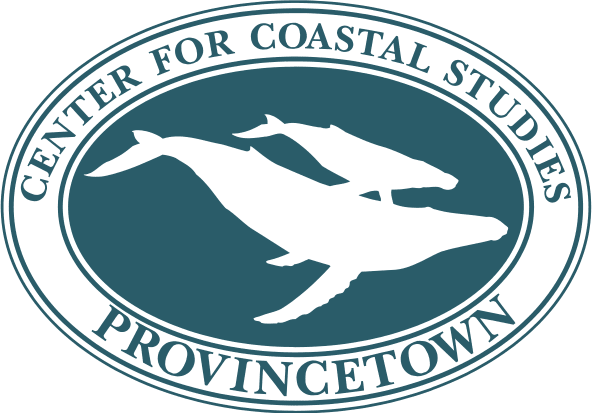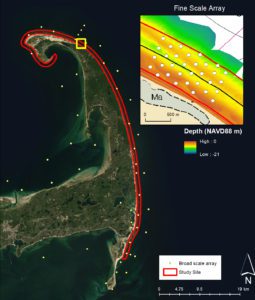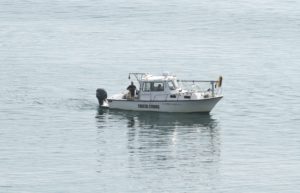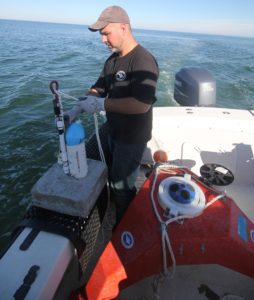Shark Ecology Research Program
The purpose of the Shark Ecology Research Program is to understand habitat use by sharks and other marine animals.
The core component of our research is determining the connections between the behavior and habits of individuals and populations of macro-organisms and the habitats and food resources they utilize. This is achieved by studying datasets of the biology and behavior of sharks and other marine organisms to determine spatial and temporal patterns of use within a specific habitat. This information – when, where and how the animals travel through and within an area – helps resource managers and local communities understand the impacts of certain human activities on the marine ecosystem and mitigate potential interactions between humans and sharks and other marine life.
CURRENT PROJECTS
Fine-scale shallow water movements of white sharks (Carcharodon carcharias) on Cape Cod, Massachusetts.
This first of its kind study sheds light on the daily movements of white sharks in shallow waters off Cape Cod.
The white shark (Carcharodon carcharias) is the largest predatory fish in the world. As white shark populations in the Atlantic Northwest are rebuilding, predictable seasonal aggregations of white sharks are forming along Cape Cod, Massachusetts. On Cape Cod, white sharks pose a risk to public safety as incidences of human and white shark interactions are on the rise.
To examine patterns of white shark movements through the area relative to the local physical conditions, researchers use a dense array of acoustic receivers to track the position of previously-tagged sharks as they pass through the area. Researchers collected high-resolution (2-3 cm) sidescan imagery and bathymetry (seafloor topography) of the seabed with an Edgetech 6205 phase-measuring sidescan sonar. In addition, data on oceanographic conditions, i.e. currents, tides, wave conditions and turbidity, were collected with an Acoustic Doppler Current Profiler (ADCP), pressure loggers, and light meters.
The study shows that, generally, patterns of presence and absence of great white sharks in the shallow water habitats are associated with bathymetry (with banks and troughs on the seafloor determining individual pathways through the study area), changes in oceanographic conditions, and high-energy weather systems.
This project is funded in part by the National Park Service and the State of Massachusetts via the MA Division of Marine Fisheries
- Study area at Head of the Meadow in N. Truro, MA
- Sidescan sonar platform R/V Marindin
- Program Manager Bryan Legare deploying ADCP and acoustic receivers
Remote Monitoring of Seals at Head of the Meadow Beach, Truro (conducted in collaboration with the CCS Seal Research program)
Seals are an important food resource for white sharks. This study seeks to understand the movement and behavior of gray seals as it relates to white shark movements. Gray seals (Halichoerus grypus atlantica) are monitored at seasonal (non-breeding) tidal haul-outs using a series of remote trail camera stations to document and quantify various behaviors. These monitoring stations overlap geographically with the location of the white shark research described above.
Seal behavior and presence will be compared with various physical conditions including wave, wind, current and tide. This study will allow us to examine the relationships between seal behavior, oceanographic conditions, and the presence and movement of white sharks in the area. Anecdotally, gray seals change their behavior and presence at various haul outs along the Cape in correspondence with different tide and wave regimes. It is expected that white sharks will then alter their behavior accordingly.
Understanding the movement of seals and white sharks will help develop a better understanding of the trophic ecology and aid in conservation and mitigation measure proposed by local, state and federal managers.
This project is funded in part by the State of Massachusetts via the MA Division of Marine Fisheries and private donations. Authorized under NOAA permit #21719-1
MEET THE TEAM
Bryan Legare Manager, Shark Ecology Research Program
Bryan is a Seascape Ecologist in the Department of Geology at the Center for Coastal studies and a PhD Student at the University of Massachusetts Department of Ecological Conservation. He received his MS in Marine and Environmental Science from the University of the Virgin Islands in 2011 and his BS in Biology from the University of New Hampshire in 2007.
Scientific Partners
Greg Skomal, PhD Massachusetts Division of Marine Fisheries
Megan Winton Atlantic White Shark Conservancy
Andy Danylchuck University of Massachusetts Amherst
New England White Shark Research Consortium
Cape Cod National Seashore
Community Sponsors
8 Dyer Hotel, Provincetown
Harbor Lounge, Provincetown
Yolqueria, Provincetown
The Gaslamp Bed & Breakfast, Provincetown
Atlantic House, Provincetown
Boston Urban Hospitality
Provincetown Brewing Company
Hook Provincetown
Town of Truro, MA
Town of Orleans, MA



